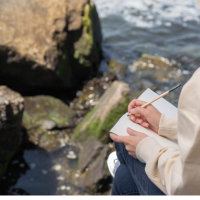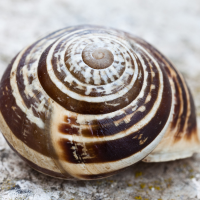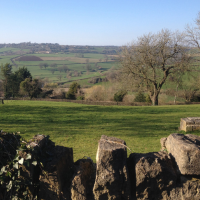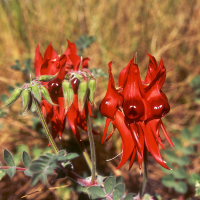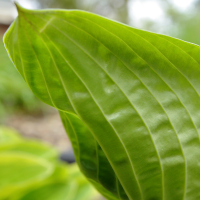2nd June 2025
Playing with words
Words help us notice more deeply, remember more clearly, and connect more personally with nature. Today we are going to explore the power of words in our nature journals, touching on ways of describing and communicating about the natural world, sharing words across languages, keeping words alive, as well as the importance of the names we give to life on earth.
Live event
*You can use a timezone converter to check the workshop time in your area.
2nd June, 4pm - 5pm Pacific; 3rd June, 9am - 10am Brisbane, Australia (AEST)
Nature journaling prompts and ideas
We can become word collectors! It can be an enjoyable exercise to make collections and lists of nature words that you can add to or revisit whenever you like. These word lists can enrich you nature vocabulary and be a place to savour the joys of language. A simple internet search is a great place to start to find exciting and unusual nature words. This list of Top 10 Most Beautiful Nature Words by Grammarly has some inspiring words you could use to start your first list.
Start a collection of your favourite nature-related words. Include words you love because of their sound, meaning, or imagery they evoke. You can even decorate the list with sketches or doodles to match the mood of the words.
As a global community of nature loving creatives, we have the opportunity to share words in our own languages and show others the beauty and uniqueness of words. This list from Eunoia shows nature related words that cannot be directly translated.
Reach out to a nature journaler who speaks a language other than your own. You can chat with people from around the world over on the International Nature Journaling Week Facebook page. Ask them about their favourite nature words in their own language. Find a word in another language that doesn’t exist in your own and see if you can incorporate it into your nature journal.
Our very own Jules Woolford, has compiled an amazing Pinterest board for ways to describe nature. You can explore her board here.
Are there particular nature writers who describe nature in a way that speaks to you? Does reading inspire you to write your own nature descriptions? Follow the lead of other nature writers and spend time writing a description of something in your nearby nature. Use Jules’ Pinterest board as a starting place.
After a revised edition of the Oxford Junior Dictionary excluded a range of common nature-related words, Robert Macfarlane and Jackie Morris launched the Lost Words, a creative project to highlight and bring back words to describe the British countryside.
Find an unusual nature-related word that you like the sound of and begin using it in your nature journal. Let it become an everyday part of your own personal nature lexicon and, in this way, you will be contributing to its survival.
Many of us (for example those living in Australia, USA and Canada) live on the traditional lands of indigenous people. The languages of these lands have been affected by a colonial history sadly marked by language suppression and erasure. There are efforts to highlight and promote the importance of maintaining language. You can read more about the Indigenous Australian languages and how they connect people with land and culture.
If you live on indigenous land, see if you can discover more about the languages that are traditionally spoken there. Can you learn some of the words used to describe nature?
We owe the recognised system of scientific nomenclature to the 18th century biologist Carl Linnaeus. It is a classification system where each organism is given a two-part Latin name, identifying it within its genus and species. This classification system has meant that scientists and lay people can communicate about organisms with more precision and less confusion (although species are frequently reclassified as new information is discovered).
Learning the scientific names of the organisms around you can be a fun exercise and make you feel more connected with different species. When you upload a photo to the app iNaturalist, you will often be provided with the common and scientific name of your species. Try including scientific names in your journal. There are a couple of conventions when writing scientific names. The genus name is always capitalised and the species name always has a lower case, for example, Homo sapiens. If you are typing the scientific name, use italics, and if you are writing it, underline the name.
If you are enjoying the week, please consider making a donation to help cover the cost of running the event.
Your generous support helps make International Nature Journaling Week possible.
Thank you!


